#this is why i never go on tumblr
Text
I wish we could have met in some other way.
Lawlight Week Day 2: Soulmates
If you saw me repost and re-edit this several times uh No you didn't </3
Still frames/Individual gifs:




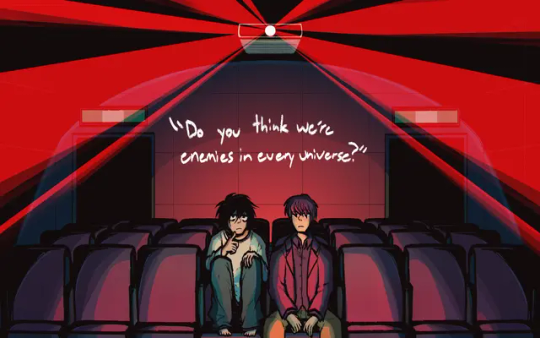
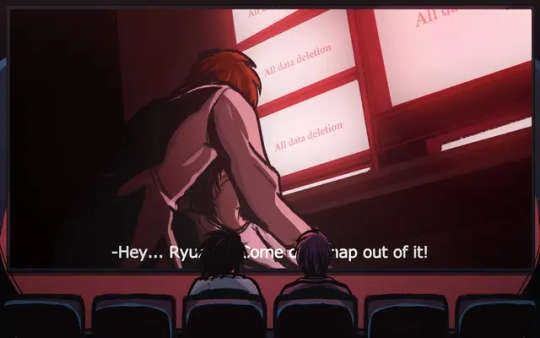
If you know what every frame is from you get a free cookie. by the way
#death note#dn#light yagami#l lawliet#lawlight#oh god here we go#death note jdrama#death note 2015#death note 2006#death note musical#lctw#l change the world#dntm#lawlightweek2024#my art#collapses i am NEVER putting this much effort in one piece ever again /hj this was the Only one i had mostly prepared in advance#ironically the most painstaking part about making this entire thing was converting the images into an animated file#that wasn't either horrifically compressed or just. wouldn't loop. why do gifs have to look so BAD it's so inconvenient#and THEN i realized I had to forcibly Stitch the two animations together so they would actually be synced and it wouldn't look dumb#and the end result is STILL so compressed. because Tumblr. uhhh just don't click on it it'll look so scuffed LOL. anyways#this is what i get for watching Every Adaptation of Death Note. i am a death note multiverse truther#usually i'd have something clever to say in the tags but. this drained the life out of me just uh.#yeah. they're doomed in every universe. this is the only way they could've met. they are doomed by their own natures and the#circumstances that surround them. there is no universe where light tries to prevent L's death. and even in the cases where L Doesn't die#there is no universe where L can save light. there is no universe where he can truly “catch” Kira and make him see where he went wrong#(<- if you read LCTW you know. :) )#in every universe and adaptation L will call Light his first friend. in some universes they'll take that notion more seriously than others#no matter what one of them will die due to the other. its the only constant. it's the only way it can ever be. they are the others downfall
3K notes
·
View notes
Text

uh guys why would someone say that to a grown ass man i dont get it
#i drew this months ago but never posted it <//3 so here u go#i've been too busy playing minecraft thats why i vanished like.. one might say... a Ghost#anyways aha#trans#wolverine#my art#ghostlydoodles#james logan howlett#xmen#artists on tumblr#trans pride#x-men#transgender#x men#marvel#lgbtq
3K notes
·
View notes
Text


me and my gf :3 (she is made of water)
#warrior cats#moonpaw#moon^2#changing skies#flipnote#i've been experimenting with my 3ds recently. the reason why there's a detailed rotating heart is because i wanted to draw it#shes not going to be a tuxedo but i hope she's a tuxedo. tuxedo moonpaw is real to me#if youre not an animator and youve never seriously tried using flipnote i recommend it tbh. i've been teaching myself to animate#i like that you can just focus on the basics. i can see myself moving onto a real animation program at some point#ok tumblr please be nice thank you
1K notes
·
View notes
Text
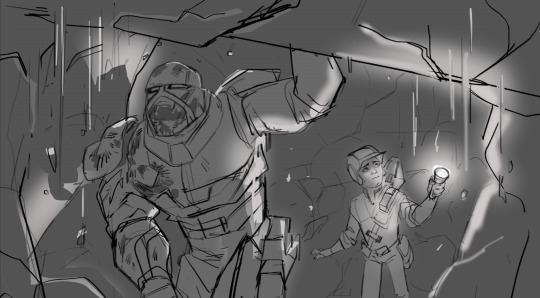

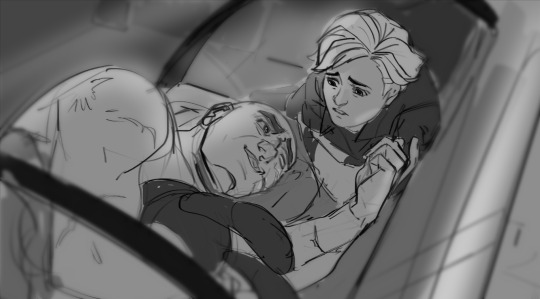
Fics rec of the week, and especially if you like well-written Wrecker, is the entire work of @electrikworm on AO3
In order:
The Batch have a terrible day
Human Shield
A peaceful moment
(But go read the others too)
#star wars#star wars the bad batch#the bad batch fanart#tbb fanfiction#tbb wrecker#tbb omega#again luring you all to suffer with me#hurt/comfort my BELOVED#Some of the best Wrecker fics outa there#go comment on them and all#I already ranted in the previous post so you're free#Slowly illustrating all the fics saved on my phone#Next ones are probably gonna be more angsty tho#I love drawing Wrecker tbh#tho I always fk up his proportions#I'm so bad at keeping proportions TAT#that's why I can't draw fast for s 'cause I check and recheck all the time#and it's never righhhhht#shoulder to head ratio who are you#Trying to give a spotlight to all the Batch haha#impossible#ok time to close (again) tumblr for a week#bye
673 notes
·
View notes
Text


something something, pick your poison

i gotta post this too cause i still think its funny & its been floating around my drafts for like 6 months atp

#o’shones#karen jones#molly o’shea#molly oshea#rdr2 fanart#hazelgooseart#rdr2#i am going to suddenly spam my blog with fanart dumps one of these days. or maybe never#…i did not mean to post this. hence why its still so sketchy. i pressed save/save as draft. hitting tumblr mobile with a hammer
539 notes
·
View notes
Text
















You wanna hear a good story? Listen to this one.
Mobius + comfort
#owen wilson#mobius#mcuedit#lokiedit#marveledit#loki#marvel#owenwilsonedit#dianagifs#CHARACTER OF ALL TIME FOREVER BELOVED#thank god this is my own post and i'm not about to write a tag essay under some pour soul's set bc here we go lmao#imagine MAKING comfort at a place like the tva!!#where we know what happened when he hesitated#and also explains the general antagonistic attitude towards him by most of the other hunters in s1 bc why would they respect him afterwards#but he never stops believing things will get better because if he can change so can anyone else#when d-90 essentially apologizes for KILLING him how could mobius do anything but offer forgiveness#when he himself had followed the guise of those same orders to kill and understands what it feels like to realize that#for all the reassurance and support he gives everyone else the most he ever allowed himself was a dream#which led to the same rapt attention and focus from a god no less in order to finally be seen for the first time and appreciated bc of it#then as always owen showed this in a million ways from microexpressions to line delivery so guess i'll just yell about it for eternity#(or at least some more in my mind since tumblr is cutting this off in search unless i trim the tags but y'all feel me ✌️😅)
354 notes
·
View notes
Text

bug doodles so i can say i drew something
#oc#original character#alien oc#artists on tumblr#art#aliens#sketch#nyx#having a rough month creatively. and mentally. like a really really rough month. but i'm tired of saying that too#i made like three things this year i was excited about and that's it. where did the fun go. im supposed to enjoy it right#if i dont enjoy it then what is the point !!!!!!!!!!!!!!!!!!!!!!!!!!!!!! of anything !!!! i dont enjoy Anything anymore even !!!!!!!!!#why is it already august. almost september. i dont even remember most of 2023 let alone 2024.#i got no drive to draw let alone to push through a drawing when it gets challenging or doesn't turn out right. i barely drew this month#just kinda hated everything. nothing is fulfilling#IF IM NOT HAVING FUN !!! THEN WHAT IS THE POINT !!! WHAT AM I DOING IT FOR#more and more i consider taking a hiatus from art. but what the fuck else do i do with my time then. what if i never come back to it#i got a list of stuff i could draw but either i try and i dont like it or i sit there and wonder why even bother because i wont enjoy it#guys im tired. im so exhaustingly overwhelmingly depressingly fucking tired and i feel no joy in my art#or videogames. or anything.#i need to go to bed
260 notes
·
View notes
Text
Fuck it, silly poll time. What is your most hated face emoji? The one you wish you could stop people from using forever?
Bonus Challenge: Don't get ACTUALLY upset at people over emojis. 🙂
#I'll go first#i hate 😭 with a burning passion#it never fails to send me into a chihuahua level rage when i see it#i cant explain why#i just hate it with my entire being#pointless drama ass looking mf#TO BE CLEAR#THIS IS PLAY FIGHTING#ENRICHMENT FOR YOUR TUMBLR ENCLOSURE IF YOU WILL#NO HARD FEELINGS#emoji#emojis
405 notes
·
View notes
Text
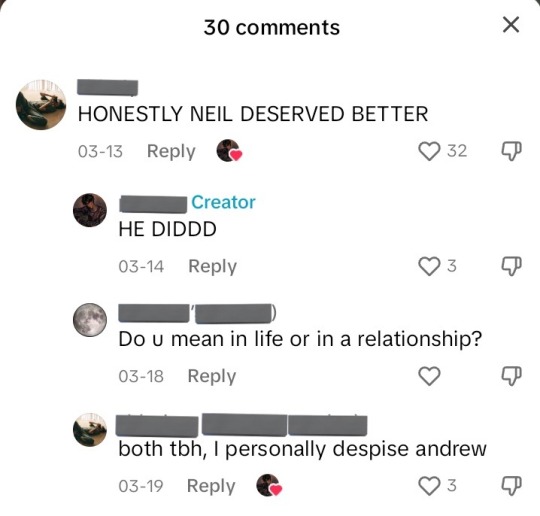
Hi I’m also looking for local work around the area.
#when I tell u my jaw dropped#and I was already thinking of a murder weapon and where to hide the body#this is why I never go on booktok#only Twitter tumblr and Instagram#I hate it here#y’all let’s gatekeep aftg again#we cant let these people exist#aftg#all for the game#tfc#the foxhole court#aftg series#aftg fandom#aftg incorrect quotes#andrew minyard#neil josten#andrew joseph minyard
232 notes
·
View notes
Text

Once again I offer you art that I didn't post when it was made✌🏻 One thing I have learned is to never throw away your art because even if you don't immediately like it you might some day
#and this isn't to say I don't cringe at some of my old art 😂 I think that's just an inescapable part of the experience#I think it's mostly perfectionism that stops me from liking some of my drawings#because fairly often I just randomly find a drawing that I actually really like but never posted cause I deemed it not good enough#and then later I'm like “so what if there are weird mistakes that stick out to me. If someone else had drawn this would I think this way”#and I see the parts that stopped me from posting a piece and am like why did it seem so important back then#I love looking through my old art and being like I'm so glad I drew this#especially if it's something I had forgotten about#idk what brought this art ramble on ig I'm just happy to find joy in creating when there's so much a i bs going on#also the paper this is drawn on literally has “why can't I draw anymore” on it so if you're feeling artblocky know that it will pass#violetscanfly#artists on tumblr#watercolour#wei wuxian#mo dao zu shi#mdzs fanart#mdzs#wei ying
172 notes
·
View notes
Text
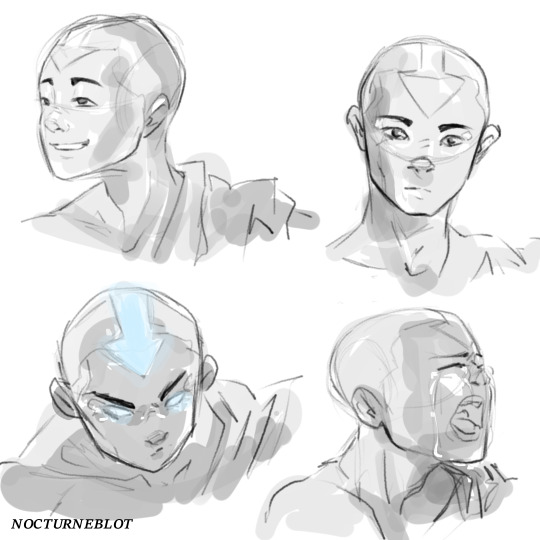
here's 18-19 year old aang sketches. been hearing aang is ugly discourse—no he ain't. he was just 12.
#i really wanted to take part in zukaang bingo but the urge to art struck me a little later#i still might make something else later#enough art for now#i'd try to participate in maiko week but i'm not sure#it's smack in the middle of end semester exams#ink blot#avatar fanart#avatar the last airbender#atla#artists on tumblr#fanart#avatar aang#why did i never use the pencil brush before?!?! i seriously have a personality flaw where i just don't explore stuff.#can you believe i've been using the same fucking brush for lineart ever since i started digital art?#anyways! i don't know how the pencil brush would feel like if i go for colours but this is impeccable.#I have more control over stuff and i love the result#so#i have promised myself i'd be fucking off this hellsite because i have a huge backlog of work that needs to be done#and i'm presently suffering from “can't help but art”. so#yeah. y'all would probably see me around maiko week. byeee!#if i deprive myself of drawing for too long it bursts out of me like this where i do nothing but draw#not healthy at all
247 notes
·
View notes
Text
weren't y'all making fun of twitter blue???
#tumblr#tumblr premium#tumblr update#twitter blue#i get y'all need to make money#but like... you also never get rid of the terfs and nazis#actively block trans women and will often block content that doesn't even name trans women but alludes to them#like i love this site but i fucking hate the people in charge and why i don't ever want to give them money#also $6.99usd is $10.60aud#i am not fucking paying a SOCIAL MEDIA WEBSITE TEN DOLLARS#anyways their stupid fucking go premium banner has fucked up the old tumblr stylist extension and now i can't access the topbar
98 notes
·
View notes
Text
i. Reading Looking For The Good War has, among many other things, I think really helped me to clarify and articulate what I find so disquieting about "Points" as an episode. (Which is not all of it! There are certainly plenty of scenes that I find fascinating and/or enjoyable to watch.) But:
"It is much easier to tell a sentimental war story with a happy ending, in which valor eclipses causes and reconciliation triumphs over everything--a comedy, in other words--than it is to tell another, unsentimental kind of story." (page 89)
This is what it is, exactly--"in which valor eclipses causes and reconciliation triumphs over everything" could more or less be the logline of "Points." This is most egregiously evident to me in the scene of Nazi general's surrender, but the scene where Winters tells the Nazi officer to keep his sidearm is also I think highly indicative of this drive towards reconciliation, however rotten, above all else. And Samet articulates that wonderfully, and articulates as well the cost of this type of narrative:
"Yet sentimentality does more than shape the way we commemorate wars. It informs all those cultural and sociological attitudes in the shadow of which wartime and postwar policies are crafted, and it prevents a more productive and enduring sympathy that, in cooperation with reason, might guide our actions and help us become more careful readers of war's many ambiguities and false seductions." (page 83)
ii. The layers of dislike I have for the Nazi general scene are manifold; the mirroring of Winters and the Nazi general and thereby Easy Company with the Nazi soldiers feels incredibly sinister, perhaps most aggressively so in its weird push to rehabilitate the Nazis as soldiers, and thus to both foreshadow (within the world of the show) and echo (in the world of the audience) the archetypal defense that Nazi higher-ups would put forward at Nuremberg and beyond, that they were just following orders.
iii. The mirroring of Winters and Easy Company with the Nazis is clearly intentional, and somewhat bizarrely explicit ("You've found in one another a bond that exists only in combat among brothers") and maudlin (the panning shots over the Nazi soldiers' faces and wounds), and by the end the urge to parallel the two leaders and the two armies--indeed, to collapse one into the other, in order to make them functionally the same--seems to cause a sort of scriptwriting amnesia about who these words are actually being said by and to. Once again the greater historic context makes this especially chilling, Operation Paperclip being perhaps the most salient point to evoke. (I am also haunted, forever, by a statistic that Michael C. C. Adams cites in The Best War Ever, that a September 1945 survey of American GIs found that 22% believed the Nazi treatment of Jewish people to be justified. Granted, this survey would not have been taken using modern sampling methods, and who knows what the sample size was to begin with or what soldiers in particular were being surveyed. But still.)
iv. The scene leans heavily into the idea of a unique soldierly bond that unites not only each individual army within itself but bonds the two armies together. ("You've found in one another a bond that exists only in combat, among brothers who've shared foxholes, held each other in dire moments, who've seen death and suffered together.") Besides being disquieting for reasons I state above, I think it's notable that the Nazi general's speech emphasizing the brotherhood of soldiers happens directly after the short scene between Winters and Sobel, wherein Winters chides Sobel on a point of military ritual ("We salute the rank, not the man"). Sobel is outside the brotherhood; he doesn't understand how to be a soldier; whereas the Nazis are within the brotherhood, so much so that they are allowed to articulate its terms. (This is egregious no matter what, but becomes all the more so when it is framed as a Jewish man being excluded from the "club" of military brotherhood while WASP Americans and literal Nazis are allowed in.) (Meanwhile, Liebgott occupies a sort of bizarre placement in this scene, there to ventriloquize--indeed, perhaps neutralize, or even legitimize--the Nazi general's words, but not speak for himself.)
v. This gets to another point that Samet makes that stuck out to me, about the inherent tautology of military culture. She quotes William Styron, who in a 1964 review of General Douglas MacArthur's memoir said:
"Anyone who has lived as a stranger for any length of time among professional military men, especially officers, is made gradually aware of something that runs counter to everything one has been taught to believe—and that is that most of these men, far from corresponding to the liberal cliché of the super-patriot, are in fact totally lacking in patriotism. They are not unpatriotic, they simply do not understand or care what patriotism is. [...] A true military man is a mercenary [...] and it is within the world of soldiering that he finds his only home." (Samet quotes Styron on page 233; I'm quoting here from the full review)
The point of being a soldier is to be a soldier; the point of the military is to have a military. She also has this to say--especially saliently, I think, for obvious reasons--about Ambrose, and his perspective specifically in Citizen Soldiers:
"By means of emphasis and convenient omission, Ambrose preserves his focus on unity, not division; right, not wrong; liberation, not subjugation. Paradoxically, given that he makes so much of American idealism, he often subordinates a consideration of causes altogether to a veneration for the magnificence of the army itself. The creation of that army, rather than the victory it made possible, becomes 'the great achievement of the American people and system,' just as the nation's 'greatest nineteenth-century achievement' had been, according to Ambrose, 'the creation of the Army of the Potomac' rather than the end it eventually secured--the abolition of chattel slavery." (page 46)
Here we are back to the first Samet quote from above: valor eclipses causes and reconciliation triumphs over everything. To be a military man--to be part of the club, the brotherhood, the "bond that exists only in combat"--is to "subordinate a consideration of causes altogether to a veneration for the magnificence of the army itself." The country and the cause that the Nazi general and his soldiers fought "bravely, proudly" for become sublimated, while that bravery and pride, stripped of more specific meaning, is extolled. What matters, by the time this scene happens--and it's the last scene in the core section of the episode, followed only by the close of the frame structure with Winters and Nixon and then the baseball scene-cum-epilogue--is not the American cause that Easy Company was fighting for, and certainly not the Nazi atrocities they were fighting against, but rather a reconciliation that views the experience of war as preeminently important. Sobel, who did not experience combat, is dismissed; the Nazi general, who did, is legitimated.
vi. And that, I think, is the core of the message that Band of Brothers promotes. Fandom often refers to the show in passing as propaganda, but I'm not sure that really gets to the heart of what it is, in the end, saying. I would suggest that it's not merely propaganda; it's a recruitment poster. It's not selling truth, justice, and the American way (or if it is, it's doing so only incidentally); it's selling the experience of being in the military as a transformative and ultimately positive one, that unites (a certain subset of) men through the unique crucible of battle, beyond any concerns about what, exactly, one is fighting for. So long as you know when and how to salute, you too can be a part of the brotherhood.
vii. All of which gets back to the scene earlier in "Points," when the Nazi colonel surrenders to Winters. The colonel first makes the explicit parallel between the Nazis and the Americans, and between himself and Winters in particular: "I wonder what will happen to us, to people like you and me, when there are finally no more wars to occupy us." He serves to explicate here more or less exactly what I was saying above: he sees himself and Winters united as military men, above and beyond their particular countries and causes.
Winters doesn't look thrilled about the comparison--but then almost immediately tells the Nazi colonel to retain his surrendered sidearm. I suppose this is supposed to read as magnanimous and fair-minded on Winters's part, but it also serves to reinforce the Nazi colonel's own words, validating the colonel's prioritization of their shared military positions above and beyond their allegiance to the countries and ideologies they were (at least nominally!) fighting for. As the scene itself shows, giving up a sidearm is an expected part of the surrender process, both practically and symbolically; by refusing it Winters is stepping outside military precedent--indeed, bending over backwards--to help the Nazi colonel retain dignity as well as firepower. On its own it is, I think, a frustrating and uncomfortable scene; in the broader context of the episode it sets up and reinforces the Nazi general's speech later on and the ways that Winters and the show itself find meaning in paralleling and reconciling the Americans and the Nazis with one other. (The Nazi colonel knows how to salute; and when he does so, Winters salutes him back.)
viii. Of course it's historically true that American soldiers tended to identify with German soldiers and civilians much more than they identified with people from Allied countries, as Samet herself and even the veteran interviews at the beginning of "Why We Fight" document. (And I don't believe that paralleling the Americans and the Nazis is necessarily something to be dismissed out of hand.) But because the end of "Points" is so overtly sentimental, paralleling the Americans and Nazis serves not as an indictment of American soldiers' amorality but rather as a rehabilitation of the Nazi soldiers and officers as soldiers and a paean to military culture divorced from meaning or cause. As Samet says--"valor eclipses causes and reconciliation triumphs over everything." The military, as an institution, whether it be American or Nazi, becomes the greater good of the war; while the causes those militaries were fighting for become not only secondary, but recede entirely.
#this is less 'notes for an essay i'm never going to write' and more 'working through my own feelings (with citations)'#band of brothers#wwii#according to the tumblr draft datestamp i started writing this almost three weeks ago#and it feels like there has been an uptick in discussion of ''points'' since then which this was written largely separately from#so if i seem to be over-explaining some of my points that is probably why#(that said if i am under-explaining any of my points i would be happy to get into it more as well)
89 notes
·
View notes
Text
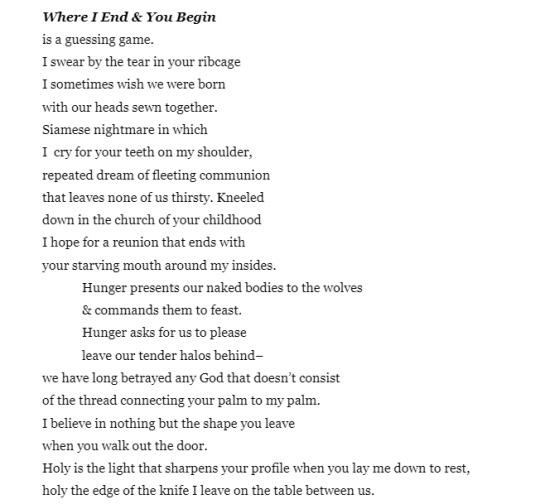
Where I End & You Begin, Dante Émile. Published in From Heart To Stomach vol. 1.
539 notes
·
View notes
Text

mew meow + crunchy pixelated variant + non edited version that you were never meant to see. Pls click for quality as tumblr destroys everything lol

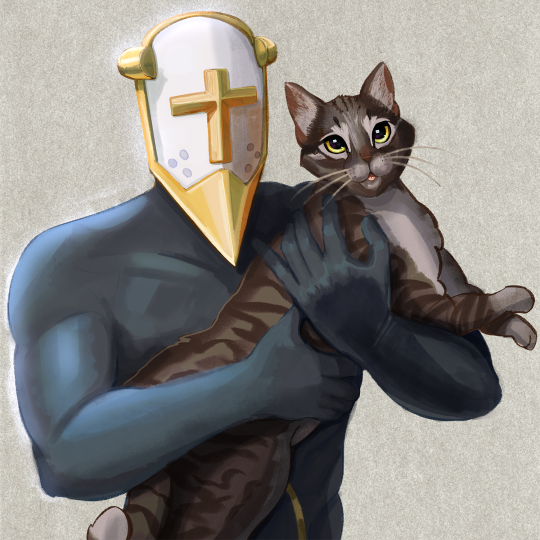
#ultrakill#my art#tumblr try not to destroy image quality challenge (impossible)#yet another image for the quotes nonsense#i like the colors of the pixel ver better lol#I say never meant to see cause it’s pretty rough#and I knew I was going to edit it so it didn’t need to be perfect#but as you can see a lot of the rendering on the gold was lost in editing#which is why I didn’t bother detailing it much#mainly cause I don’t have the energy to do anything fully rendered at the moment#idk how to draw people I suffer for him..
161 notes
·
View notes
Text

momma is so strong! ❤️❤️❤️
#twdg#twdg s2#twdg clementine#twdg kenny#twdg luke#twdg jane#mommy dom jane!!#it’s canon guys trust#what did i do to clem?… :(#i’m never going on tumblr again why did i make this???#luke and his top!!
90 notes
·
View notes